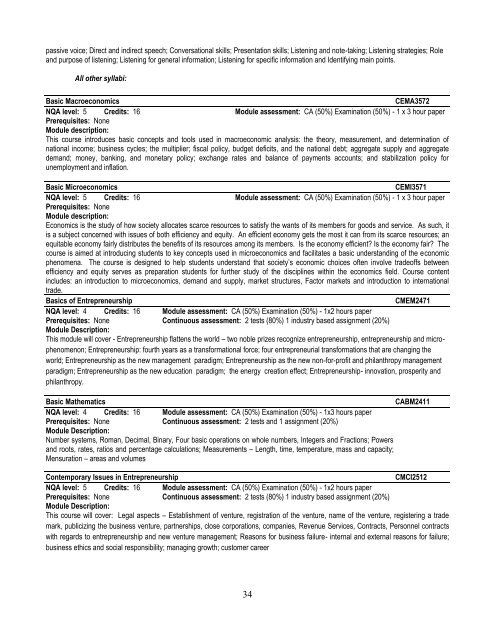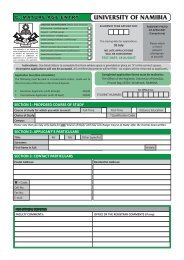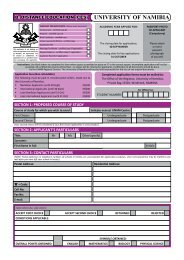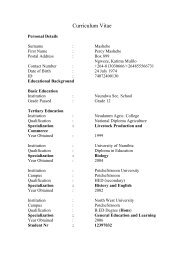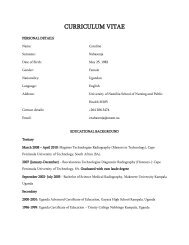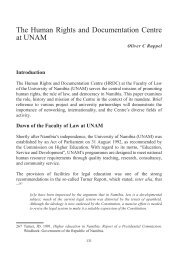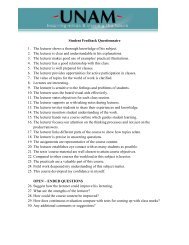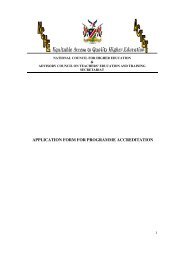UNIVERSITY OF NAMIBIA CENTRE FOR EXTERNAL STUDIES ...
UNIVERSITY OF NAMIBIA CENTRE FOR EXTERNAL STUDIES ...
UNIVERSITY OF NAMIBIA CENTRE FOR EXTERNAL STUDIES ...
Create successful ePaper yourself
Turn your PDF publications into a flip-book with our unique Google optimized e-Paper software.
passive voice; Direct and indirect speech; Conversational skills; Presentation skills; Listening and note-taking; Listening strategies; Roleand purpose of listening; Listening for general information; Listening for specific information and Identifying main points.All other syllabi:Basic MacroeconomicsCEMA3572NQA level: 5 Credits: 16 Module assessment: CA (50%) Examination (50%) - 1 x 3 hour paperPrerequisites: NoneModule description:This course introduces basic concepts and tools used in macroeconomic analysis: the theory, measurement, and determination ofnational income; business cycles; the multiplier; fiscal policy, budget deficits, and the national debt; aggregate supply and aggregatedemand; money, banking, and monetary policy; exchange rates and balance of payments accounts; and stabilization policy forunemployment and inflation.Basic MicroeconomicsCEMI3571NQA level: 5 Credits: 16 Module assessment: CA (50%) Examination (50%) - 1 x 3 hour paperPrerequisites: NoneModule description:Economics is the study of how society allocates scarce resources to satisfy the wants of its members for goods and service. As such, itis a subject concerned with issues of both efficiency and equity. An efficient economy gets the most it can from its scarce resources; anequitable economy fairly distributes the benefits of its resources among its members. Is the economy efficient? Is the economy fair? Thecourse is aimed at introducing students to key concepts used in microeconomics and facilitates a basic understanding of the economicphenomena. The course is designed to help students understand that society’s economic choices often involve tradeoffs betweenefficiency and equity serves as preparation students for further study of the disciplines within the economics field. Course contentincludes: an introduction to microeconomics, demand and supply, market structures, Factor markets and introduction to internationaltrade.Basics of EntrepreneurshipCMEM2471NQA level: 4 Credits: 16 Module assessment: CA (50%) Examination (50%) - 1x2 hours paperPrerequisites: None Continuous assessment: 2 tests (80%) 1 industry based assignment (20%)Module Description:This module will cover - Entrepreneurship flattens the world – two noble prizes recognize entrepreneurship, entrepreneurship and microphenomenon;Entrepreneurship: fourth years as a transformational force; four entrepreneurial transformations that are changing theworld; Entrepreneurship as the new management paradigm; Entrepreneurship as the new non-for-profit and philanthropy managementparadigm; Entrepreneurship as the new education paradigm; the energy creation effect; Entrepreneurship- innovation, prosperity andphilanthropy.Basic MathematicsCABM2411NQA level: 4 Credits: 16 Module assessment: CA (50%) Examination (50%) - 1x3 hours paperPrerequisites: None Continuous assessment: 2 tests and 1 assignment (20%)Module Description:Number systems, Roman, Decimal, Binary, Four basic operations on whole numbers, Integers and Fractions; Powersand roots, rates, ratios and percentage calculations; Measurements – Length, time, temperature, mass and capacity;Mensuration – areas and volumesContemporary Issues in EntrepreneurshipCMCI2512NQA level: 5 Credits: 16 Module assessment: CA (50%) Examination (50%) - 1x2 hours paperPrerequisites: None Continuous assessment: 2 tests (80%) 1 industry based assignment (20%)Module Description:This course will cover: Legal aspects – Establishment of venture, registration of the venture, name of the venture, registering a trademark, publicizing the business venture, partnerships, close corporations, companies, Revenue Services, Contracts, Personnel contractswith regards to entrepreneurship and new venture management; Reasons for business failure- internal and external reasons for failure;business ethics and social responsibility; managing growth; customer career34


